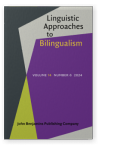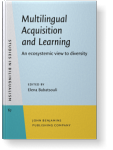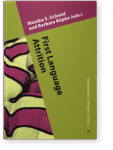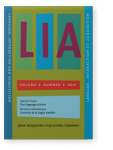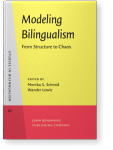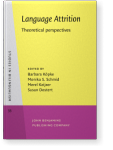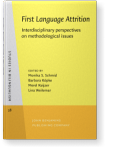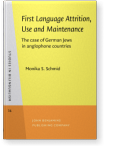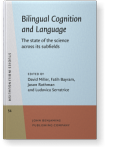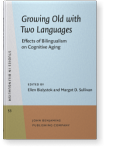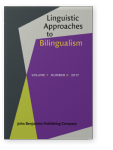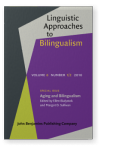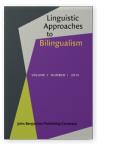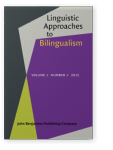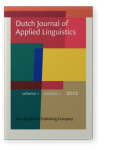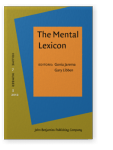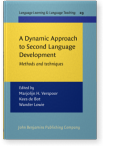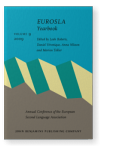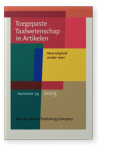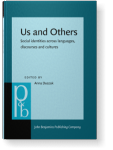Monika S. Schmid
List of John Benjamins publications for which Monika S. Schmid plays a role.
Journal
Book series
First Language Attrition
Edited by Monika S. Schmid and Barbara Köpke
[Benjamins Current Topics, 48] 2013. v, 159 pp.
Subjects Language acquisition | Multilingualism | Psycholinguistics | Theoretical linguistics
First language attrition/L'attrition de la langue première
Edited by Monika S. Schmid and Barbara Köpke
Special issue of Language, Interaction and Acquisition 2:2 (2011) v, 157 pp.
Subjects Cognition and language | Language acquisition | Multilingualism
Modeling Bilingualism: From Structure to Chaos. In Honor of Kees de Bot
Edited by Monika S. Schmid and Wander Lowie
[Studies in Bilingualism, 43] 2011. vii, 308 pp.
Subjects Multilingualism | Theoretical linguistics
Language Attrition: Theoretical perspectives
Edited by Barbara Köpke, Monika S. Schmid, Merel Keijzer and Susan Dostert
[Studies in Bilingualism, 33] 2007. vii, 258 pp.
Subjects Contact Linguistics | Language acquisition | Multilingualism | Psycholinguistics | Theoretical linguistics
First Language Attrition: Interdisciplinary perspectives on methodological issues
Edited by Monika S. Schmid, Barbara Köpke, Merel Keijzer and Lina Weilemar
[Studies in Bilingualism, 28] 2004. x, 378 pp.
Subjects Language acquisition | Multilingualism | Sociolinguistics and Dialectology
First Language Attrition, Use and Maintenance: The case of German Jews in anglophone countries
Monika S. Schmid
[Studies in Bilingualism, 24] 2002. xiv, 259 pp. (incl. CD-Rom)
Subjects Afro-Asiatic languages | Electronic/Multimedia Products | English linguistics | Germanic linguistics | Language acquisition | Multilingualism
Translating the Elusive: Marked word order and subjectivity in English-German translation
Monika S. Schmid
[Benjamins Translation Library, 36] 1999. xii, 174 pp.
Subjects English linguistics | Germanic linguistics | Syntax | Translation Studies
Historical Linguistics 1997: Selected papers from the 13th International Conference on Historical Linguistics, Düsseldorf, 10–17 August 1997
Edited by Monika S. Schmid, Jennifer R. Austin and Dieter Stein
[Current Issues in Linguistic Theory, 164] 1998. x, 409 pp.
Subjects Historical linguistics
2018 Chapter 11. First language attrition and bilingualism: Adult speakers Bilingual Cognition and Language: The state of the science across its subfields, Miller, David, Fatih Bayram, Jason Rothman and Ludovica Serratrice (eds.), pp. 225–250 | Chapter
A considerable amount of research has been devoted to exploring how bilinguals accommodate their languages. Since it has long been assumed that the native language, once completely acquired, would be immune to change, this research has mainly been focused on L2 development and L1 interference in… read more
2017 Chapter 5. Individual differences in cognitive control advantages of elderly late Dutch-English bilinguals Growing Old with Two Languages: Effects of Bilingualism on Cognitive Aging, Bialystok, Ellen and Margot D. Sullivan (eds.), pp. 77–98 | Chapter
This study addresses a gap in the literature on executive function advantages among bilingual speakers by investigating a group of elderly, long-term, immersed bilinguals. Our participants are native Dutch speakers who emigrated to Australia as adults and have spent many years in that country. They… read more
2017 The relevance of first language attrition to theories of bilingual development Epistemological issue with keynote article “The relevance of first language attrition to theories of bilingual development” by Monika S. Schmid and Barbara Köpke, pp. 637–667 | Article
Research on second language acquisition and bilingual development strongly suggests that when a previously monolingual speaker becomes multilingual, the different languages do not exist in isolation: they are closely linked, dependent on each other, and there is constant interaction between… read more
2016 Individual differences in cognitive control advantages of elderly late Dutch-English bilinguals Aging and Bilingualism, Bialystok, Ellen and Margot D. Sullivan (eds.), pp. 64–85 | Article
This study addresses a gap in the literature on executive function advantages among bilingual speakers by investigating a group of elderly, long-term, immersed bilinguals. Our participants are native Dutch speakers who emigrated to Australia as adults and have spent many years in that country.… read more
2013 L’attrition de la première langue en tant que phénomène psycholinguistique First Language Attrition, Schmid, Monika S. and Barbara Köpke (eds.), pp. 13–36 | Article
Cet article présente un aperçu de plusieurs questions que se pose actuellement la recherche sur l’attrition. Dans la première section, nous nous intéresserons à des questions de terminologie et soulignerons la nécessité de distinguer l’attrition — en tant que phénomène individuel — des processus de… read more
2013
The overwhelming bias for investigations of bilingualism is to focus on the increase of knowledge and crosslinguistic traffic from the L1 to the L2. Developments which concern loss, deterioration or reduced accessibility of knowledge and traffic from the L2 to the L1 are much less well-studied and… read more
2013 Second language acquisition and attrition First Language Attrition, Schmid, Monika S. and Barbara Köpke (eds.), pp. 1–12 | Article
2012
This paper addresses the long-term effects of being exposed to a language early in life for a limited period of time, as is the case in international adoptees. Recent findings are divided as to whether such a situation will lead to sequential monolingualism or whether speakers do remain bilingual… read more
2012 Foreign language attrition Dutch Journal of Applied Linguistics 1:1, pp. 102–124 | Article
The present contribution discusses recent developments and future directions in the attrition of instructed foreign languages, arguing for a distinction between this type of attrition and attrition involving second languages acquired implicitly in an immersion setting. An overview of the history… read more
2012 L1 accessibility among Turkish-Dutch bilinguals The Mental Lexicon 7:3, pp. 249–274 | Article
This study investigates whether lexical knowledge in the first language (L1) of late Turkish-Dutch bilinguals becomes less accessible for the production of fluent speech and in controlled experimental tasks as a result of extended stay in the Netherlands. It is also considered to what degree… read more
2011 L’attrition de la première langue en tant que phénomène psycholinguistique First language attrition/L'attrition de la langue première, Schmid, Monika S. and Barbara Köpke (eds.), pp. 197–220 | Article
Cet article présente un aperçu de plusieurs questions que se pose actuellement la recherche sur l’attrition. Dans la première section, nous nous intéresserons à des questions de terminologie et soulignerons la nécessité de distinguer l’attrition — en tant que phénomène individuel — des processus de… read more
2011 Introduction: From structure to chaos: Twenty years of modeling bilingualism Modeling Bilingualism: From Structure to Chaos, Schmid, Monika S. and Wander Lowie (eds.), pp. 1–12 | Article
2011 Contact x time: External factors and variability in L1 attrition Modeling Bilingualism: From Structure to Chaos, Schmid, Monika S. and Wander Lowie (eds.), pp. 155–176 | Article
Investigations of the language behaviour of immigrant communities usually find that the degree of maintenance of the heritage language or shift to the language of the host country differs both between immigrant communities and between individuals. On the one hand, group comparisons between migrants… read more
2011 Second language acquisition and attrition First language attrition/L'attrition de la langue première, Schmid, Monika S. and Barbara Köpke (eds.), pp. 185–196 | Article
2011 Coding and extracting data A Dynamic Approach to Second Language Development: Methods and techniques, Verspoor, Marjolijn H., Kees de Bot and Wander Lowie (eds.), pp. 39–54 | Article
2011 How to sections A Dynamic Approach to Second Language Development: Methods and techniques, Verspoor, Marjolijn H., Kees de Bot and Wander Lowie (eds.), pp. 129–200 | Article
2009 On L1 attrition and the linguistic system EUROSLA Yearbook: Volume 9 (2009), Roberts, Leah, Georges Daniel Véronique, Anna Nilsson and Marion Tellier (eds.), pp. 212–244 | Article
One of the most puzzling observations for linguists is the difference between learning a language from birth and later in life: while all normally developing children can attain full native language proficiency, there is considerable variability in ultimate attainment among older speakers who… read more
2007 Language attrition and ideology: Two groups of immigrants in Israel Language Attrition: Theoretical perspectives, Köpke, Barbara, Monika S. Schmid, Merel Keijzer and Susan Dostert (eds.), pp. 205–226 | Article
There is a great body of research on the role of attitudes, motivation and emotions for the development of bilingualism, providing compelling evidence that these factors are among the most important for predicting success in the ultimate attainment of second and foreign language learners. Attempts… read more
2007 The role of L1 use for L1 attrition Language Attrition: Theoretical perspectives, Köpke, Barbara, Monika S. Schmid, Merel Keijzer and Susan Dostert (eds.), pp. 135–153 | Article
While the factor ‘language contact’ is often named among the most important for the development of individual language attrition, empirical validations of this claim are few and far between. This contribution argues that a bilingual’s use of the first language comprises very diverse situations… read more
2007 Bilingualism and attrition Language Attrition: Theoretical perspectives, Köpke, Barbara, Monika S. Schmid, Merel Keijzer and Susan Dostert (eds.), pp. 1–7 | Miscellaneous
2005 Building Language Attrition Research Meertaligheid zonder meer, pp. 201–207 | Article
This article examines the foundations of language attrition research. As such, it argues that all attrition research should essentially build on four pillars: international contacts, theoretical perspectives, methodological perspectives and social relevance. The four pillars are discussed… read more
2004 Language attrition: The next phase First Language Attrition: Interdisciplinary perspectives on methodological issues, Schmid, Monika S., Barbara Köpke, Merel Keijzer and Lina Weilemar (eds.), pp. 1–43 | Article
2004 Language attrition research: An annotated bibliography First Language Attrition: Interdisciplinary perspectives on methodological issues, Schmid, Monika S., Barbara Köpke, Merel Keijzer and Lina Weilemar (eds.), pp. 317–348 | Article
2004 A new blueprint for language attrition research First Language Attrition: Interdisciplinary perspectives on methodological issues, Schmid, Monika S., Barbara Köpke, Merel Keijzer and Lina Weilemar (eds.), pp. 349–363 | Article
2002 Persecution and identity conflicts: The case of German Jews Us and Others: Social identities across languages, discourses and cultures, Duszak, Anna † (ed.), pp. 341–356 | Article
